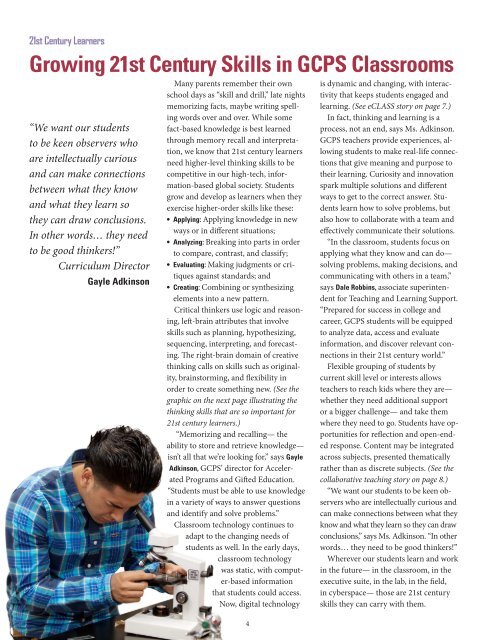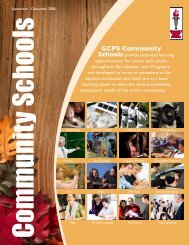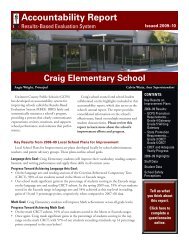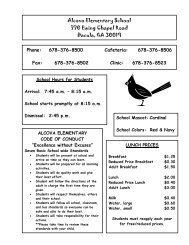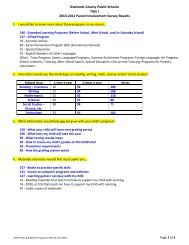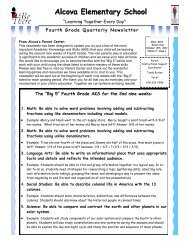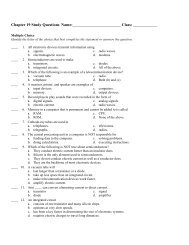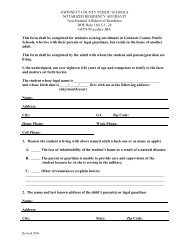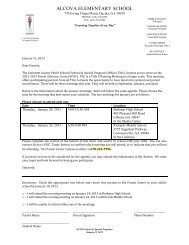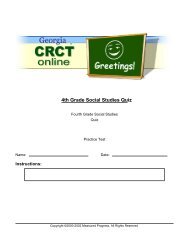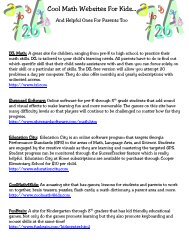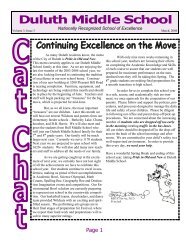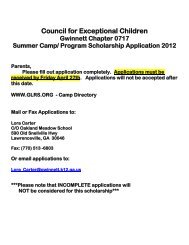21st Century Learners - Gwinnett County Public Schools
21st Century Learners - Gwinnett County Public Schools
21st Century Learners - Gwinnett County Public Schools
Create successful ePaper yourself
Turn your PDF publications into a flip-book with our unique Google optimized e-Paper software.
<strong>21st</strong> <strong>Century</strong> <strong>Learners</strong><br />
Growing <strong>21st</strong> <strong>Century</strong> Skills in GCPS Classrooms<br />
“We want our students<br />
to be keen observers who<br />
are intellectually curious<br />
and can make connections<br />
between what they know<br />
and what they learn so<br />
they can draw conclusions.<br />
In other words… they need<br />
to be good thinkers!”<br />
Curriculum Director<br />
Gayle Adkinson<br />
Many parents remember their own<br />
school days as “skill and drill,” late nights<br />
memorizing facts, maybe writing spelling<br />
words over and over. While some<br />
fact-based knowledge is best learned<br />
through memory recall and interpretation,<br />
we know that <strong>21st</strong> century learners<br />
need higher-level thinking skills to be<br />
competitive in our high-tech, information-based<br />
global society. Students<br />
grow and develop as learners when they<br />
exercise higher-order skills like these:<br />
• Applying: Applying knowledge in new<br />
ways or in different situations;<br />
• Analyzing: Breaking into parts in order<br />
to compare, contrast, and classify;<br />
• Evaluating: Making judgments or critiques<br />
against standards; and<br />
• Creating: Combining or synthesizing<br />
elements into a new pattern.<br />
Critical thinkers use logic and reasoning,<br />
left-brain attributes that involve<br />
skills such as planning, hypothesizing,<br />
sequencing, interpreting, and forecasting.<br />
The right-brain domain of creative<br />
thinking calls on skills such as originality,<br />
brainstorming, and flexibility in<br />
order to create something new. (See the<br />
graphic on the next page illustrating the<br />
thinking skills that are so important for<br />
<strong>21st</strong> century learners.)<br />
“Memorizing and recalling— the<br />
ability to store and retrieve knowledge—<br />
isn’t all that we’re looking for,” says Gayle<br />
Adkinson, GCPS’ director for Accelerated<br />
Programs and Gifted Education.<br />
“Students must be able to use knowledge<br />
in a variety of ways to answer questions<br />
and identify and solve problems.”<br />
Classroom technology continues to<br />
adapt to the changing needs of<br />
students as well. In the early days,<br />
classroom technology<br />
was static, with computer-based<br />
information<br />
that students could access.<br />
Now, digital technology<br />
is dynamic and changing, with interactivity<br />
that keeps students engaged and<br />
learning. (See eCLASS story on page 7.)<br />
In fact, thinking and learning is a<br />
process, not an end, says Ms. Adkinson.<br />
GCPS teachers provide experiences, allowing<br />
students to make real-life connections<br />
that give meaning and purpose to<br />
their learning. Curiosity and innovation<br />
spark multiple solutions and different<br />
ways to get to the correct answer. Students<br />
learn how to solve problems, but<br />
also how to collaborate with a team and<br />
effectively communicate their solutions.<br />
“In the classroom, students focus on<br />
applying what they know and can do—<br />
solving problems, making decisions, and<br />
communicating with others in a team,”<br />
says Dale Robbins, associate superintendent<br />
for Teaching and Learning Support.<br />
“Prepared for success in college and<br />
career, GCPS students will be equipped<br />
to analyze data, access and evaluate<br />
information, and discover relevant connections<br />
in their <strong>21st</strong> century world.”<br />
Flexible grouping of students by<br />
current skill level or interests allows<br />
teachers to reach kids where they are—<br />
whether they need additional support<br />
or a bigger challenge— and take them<br />
where they need to go. Students have opportunities<br />
for reflection and open-ended<br />
response. Content may be integrated<br />
across subjects, presented thematically<br />
rather than as discrete subjects. (See the<br />
collaborative teaching story on page 8.)<br />
“We want our students to be keen observers<br />
who are intellectually curious and<br />
can make connections between what they<br />
know and what they learn so they can draw<br />
conclusions,” says Ms. Adkinson. “In other<br />
words… they need to be good thinkers!”<br />
Wherever our students learn and work<br />
in the future— in the classroom, in the<br />
executive suite, in the lab, in the field,<br />
in cyberspace— those are <strong>21st</strong> century<br />
skills they can carry with them.<br />
Focusing on Critical-Thinking Skills<br />
<strong>21st</strong> century learners need to exercise a range of<br />
intellectual behaviors in order to be successful.<br />
Here’s a visual breakdown of the six levels of<br />
learning, along with examples.<br />
Thinking skill<br />
or activity<br />
Remembering/<br />
Understanding<br />
Applying<br />
Analyzing<br />
Evaluating<br />
Creating<br />
Distinguishing between<br />
different parts in order to compare,<br />
contrast, or classify, such as identifying<br />
points of view in letters to the editor<br />
Making<br />
and justifying<br />
opinions based<br />
on information,<br />
such as<br />
preparing for and<br />
participating in a<br />
debate on energy<br />
options<br />
Combining elements to form<br />
a new product, pattern, or<br />
point of view, such as writing a<br />
journal from the perspective of a<br />
pioneer on the Oregon Trail<br />
Assignments<br />
might use words like…<br />
Identify, locate, label, match, list,<br />
recite, retell, collect, outline, choose,<br />
name, illustrate, explain, discuss,<br />
observe<br />
Apply, solve, produce, build,<br />
experiment, modify, report, sketch,<br />
organize<br />
Analyze, sort, categorize, dissect,<br />
compare, contrast, survey, infer<br />
Critique, assess, appraise, conclude,<br />
justify, judge, debate, editorialize,<br />
defend<br />
Combine, invent, design, compose,<br />
write, produce, imagine, estimate,<br />
role-play, hypothesize, generate, plan,<br />
devise, organize<br />
Remember<br />
Understand<br />
Apply<br />
Analyze<br />
Evaluate<br />
Create<br />
Student activities might include…<br />
Explaining<br />
ideas or concepts,<br />
such as paraphrasing<br />
a famous speech<br />
• Memorizing and reciting multiplication tables<br />
• Paraphrasing a famous speech<br />
• Making a dictionary of new words from a story<br />
• Collecting leaves from neighborhood trees<br />
• Listing battles of the U.S. Civil War<br />
Using knowledge in<br />
new ways or in different<br />
situations, such as<br />
solving real-world algebra<br />
from a word problem<br />
Recalling<br />
information, such<br />
as listing battles of<br />
the U.S. Civil War<br />
Reflects Bloom’s Taxonomy (1956,<br />
revised in 2001), a classification of levels<br />
of intellectual behavior in learning<br />
• Setting up an experiment to test salinity<br />
• Solving real-world algebra from a word problem<br />
• Writing a fable with a moral, based on a lesson from a novel<br />
• Proofreading written work<br />
• Identifying points of view in letters to the editor<br />
• Classifying living things as mammals, reptiles, etc.<br />
• Making a Venn diagram showing similarities and differences between<br />
two novels<br />
• Determining the nutritional value of a food sample<br />
• Choosing the best way to solve a complex math problem<br />
• Preparing for and participating in a debate on energy options<br />
• Working with a peer group to give feedback and make revisions on<br />
written work<br />
• Interpreting data from a class questionnaire on favorite foods<br />
• Writing a journal from the perspective of a pioneer on the Oregon Trail<br />
• Generating a hypothesis to explain an animal’s habits<br />
• Producing a play, based on an historic event or a book<br />
• Inventing a futuristic transportation system to relieve Atlanta’s traffic<br />
problems<br />
4 5


